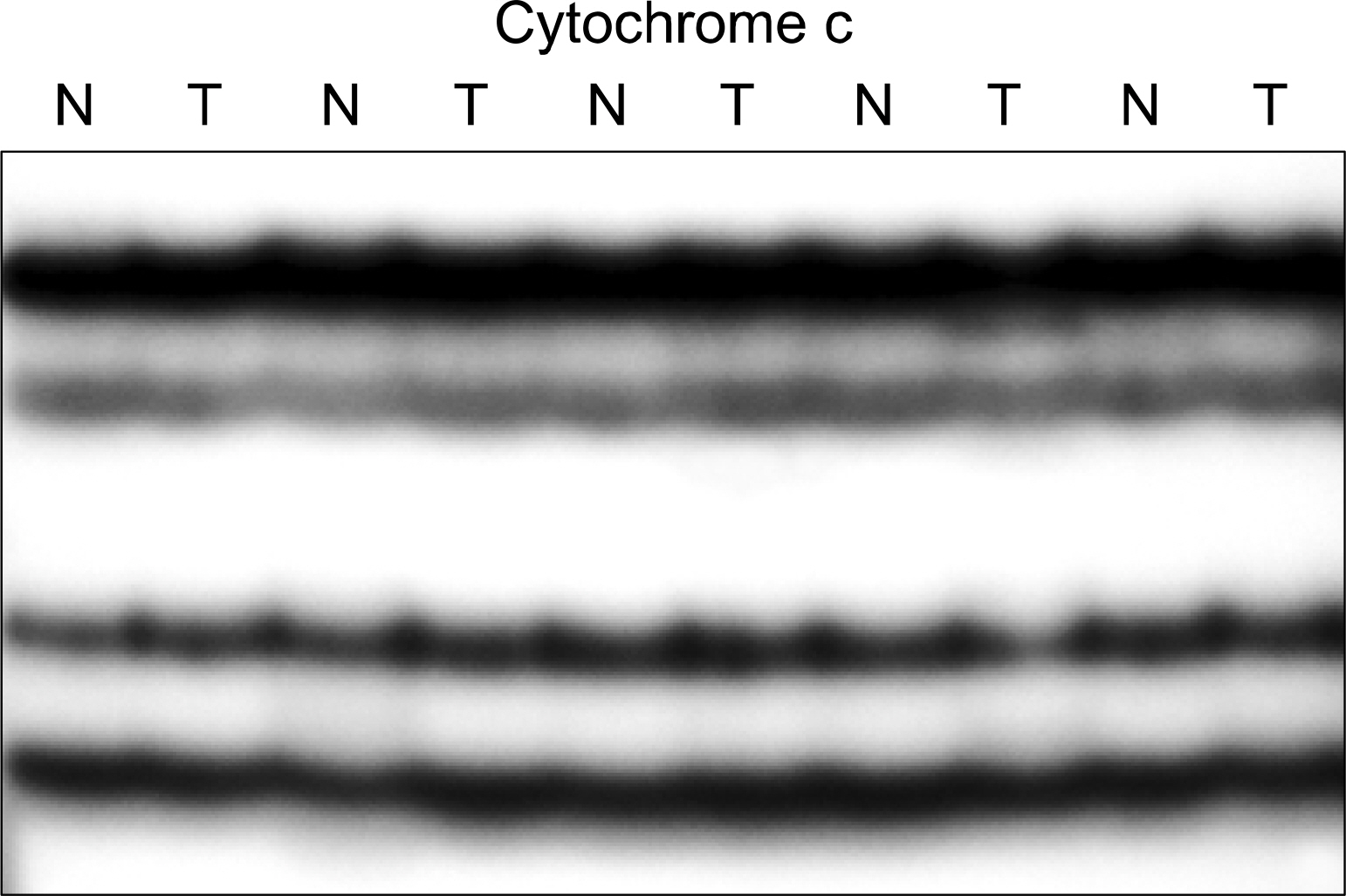J Lung Cancer.
2006 Dec;5(2):111-113. 10.6058/jlc.2006.5.2.111.
Pro-apoptotic Cytochrome c Gene Mutation is Rare in Non-small Cell Lung Cancers
- Affiliations
-
- 1Department of Pathology, College of Medicine, The Catholic University of Korea, Seoul, Korea. suhulee@catholic.ac.kr
- KMID: 2200171
- DOI: http://doi.org/10.6058/jlc.2006.5.2.111
Abstract
-
PURPOSE: Several lines of evidence have indicated that the deregulation of apoptosis is involved in the mechanisms of cancer development, and somatic mutations of the apoptosis-related genes have been reported in human cancers. In addition to its role in oxidative phosphorylation, release of cytochrome c from the mitochondrial intermembrane space results in nuclear apoptosis. The aim of this study was to explore whether alteration of cytochrome c gene mutation is a characteristic of human non-small cell lung cancers (NSCLC).
MATERIALS AND METHODS
In the current study, to detect the somatic mutations in the DNA sequences encoding cytochrome c in 48 NSCLCs, we used polymerase chain reaction (PCR), single-strand conformation polymorphism (SSCP), and DNA sequencing.
RESULTS
The SSCP analysis revealed no mutation in the entire coding regions and all splice sites of human cytochrome c gene in the 48 NSCLCs.
CONCLUSION
The data presented here indicate that the pro-apoptotic cytochrome c may not be somatically mutated in human NSCLCs, and suggest that NSCLCs may not utilize mutational events of cytochrome c gene in the mechanisms for evading apoptosis.
Keyword
MeSH Terms
Figure
Reference
-
1.Reed JC. Mechanisms of apoptosis. Am J Pathol. 2000. 39:1415–1430.
Article2.Nagata S. Apoptosis by death factor. Cell. 1997. 88:355–365.
Article3.Hanahan D., Weinberg RA. The hallmarks of cancer. Cell. 2000. 100:57–70.
Article4.Liu X: Kim CN: Yang J: Jemmerson R., Wang X. Induction of apoptotic program in cell-free extracts: requirement for dATP and cytochrome c. Cell. 1996. 86:147–157.
Article5.Soung YH., Lee JW., Kim HS, et al. Somatic mutations of CASP3 gene in human cancers. Hum Genet. 2004. 115:112–115.
Article6.Lee SH: Shin MS., Park WS, et al. Alterations of Fas (Apo-l/CD95) gene in non-small cell lung cancer. Oncogene. 1999. 18:3754–3760.7.Lee SH: Shin MS., Kim HS, et al. Alterations of the DR5/TRAIL receptor 2 gene in non-small cell lung cancers. Cancer Res. 1999. 59:5683–5686.8.Shin MS., Kim HS., Lee SH, et al. Alterations of Fas-pathway genes associated with nodal metastasis in non-small cell lung cancer. Oncogene. 2002. 21:4129–4136.9.Lee JW., Soung YH., Nam SW., Lee JY., Yoo NJ: Lee SH. Mutational analysis of pro-apoptotic BAD gene in non-small cell lung cancer. J Lung Cancer. 2006. 5:35–38.10.Soung YH., Lee UW., Moon SW, et al. Mutational analysis of caspase-7 and 8 genes in non-small cell lung cancer. J Lung Cancer. 2005. 4:38–41.11.Soung YH., Lee JW., Kim SY, et al. Mutational analysis of pro-apoptotic caspase-9 gene in common human carcinomas. APMIS. 2006. 114:292–297.
Article12.Reed JC. Apoptosis-targeted therapies for cancer. Cancer Cell. 2003. 3:17–21.
Article
- Full Text Links
- Actions
-
Cited
- CITED
-
- Close
- Share
- Similar articles
-
- Mutational Analysis of Pro-apoptotic BNIP3 Gene in Non- Small Cell Lung Cancers
- Mutational Analysis of Pro-apoptotic BAD Gene in Nonsmall Cell Lung Cancer
- Mutational Analysis of PUMA Gene in Non-small Cell Lung Cancers
- Mutational and Expressional Analysis of ATG5 Gene in Non-Small Cell Lung Cancers
- Mutational and Expressional Analysis of DOK2 Gene in Non-small Cell Lung Cancers


